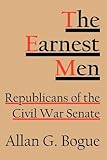The Earnest Men : Republicans of the Civil War Senate / Allan G. Bogue.
Material type: TextPublisher: Ithaca, NY : Cornell University Press, [2018]Copyright date: ©2009Description: 1 online resource (372 p.) : 37 tables, 6 charts, 2 halftones, 2 line drawingsContent type:
TextPublisher: Ithaca, NY : Cornell University Press, [2018]Copyright date: ©2009Description: 1 online resource (372 p.) : 37 tables, 6 charts, 2 halftones, 2 line drawingsContent type: - 9781501722264
- 328.73/073
- JK2357 1861
- online - DeGruyter
| Item type | Current library | Call number | URL | Status | Notes | Barcode | |
|---|---|---|---|---|---|---|---|
 eBook
eBook
|
Biblioteca "Angelicum" Pont. Univ. S.Tommaso d'Aquino Nuvola online | online - DeGruyter (Browse shelf(Opens below)) | Online access | Not for loan (Accesso limitato) | Accesso per gli utenti autorizzati / Access for authorized users | (dgr)9781501722264 |
Frontmatter -- Contents -- Preface -- Acknowledgments -- Part I. MEN, CONTEXT, AND PATTERNS -- 1. The Senators -- 2. Committees, Rules, and Leaders -- 3. Radicals and Moderates -- 4. Connections -- Part II THE SUBSTANCE OF DISAGREEMENT -- 5. Slaves, Soldiers, and Taxes -- 6. Emancipation and "Human" Rights -- 7. Punishment and Rehabilitation -- 8. Courts, Border States, and Self-Control -- 9. Designs and Perspectives -- 10. Afterword -- APPENDIX A. Roll-Call Analysis Procedures -- APPENDIX B. The Screening Procedure for the Selection of "Divisive" Votes -- APPENDIX C. Roll Calls Used Initially in Scaling Analysis -- APPENDIX D Divisive Roll Calls Radical- Moderate Division -- Index
restricted access online access with authorization star
http://purl.org/coar/access_right/c_16ec
Taking a quantitative approach, Allan G. Bogue assesses the nature of radical and conservative Republicanism in the Civil War Senate, documents the distinctions among the senators, and clarifies the factors that encouraged or discouraged factionalism. The Earnest Men is divided into two parts: "Men, Context, and Patterns" and "The Substance of Disagreement." In Part One, Bogue investigates the backgrounds of the senators and the institutional structure of the Senate, and he examines the character of leadership exercised in the Senate chamber. He then uses roll-call analysis as a means of establishing distinctions between radical and moderate senators. To account for their voting patterns, he considers living arrangements, seating, regionalism, and election results.In Part Two, Bogue looks closely at the debates in the Senate in order to ascertain the nature of disagreements between radical and moderate Republicans in such policy-making areas as slavery, taxation, human rights, punishment and rehabilitation, and legislation affecting the border states. Taking issue with the idea that the Republicans were essentially unified on the issues of the day, he finds that their differences were widespread and important. A major study of the Senate in one of its most productive periods, The Earnest Men is a remarkable combination of systematic analysis and narrative history.
Mode of access: Internet via World Wide Web.
In English.
Description based on online resource; title from PDF title page (publisher's Web site, viewed 26. Apr 2024)


